The Authors Book Club will be closing at the end of April 2024. We sincerely appreciated the opportunity to spotlight Canadian and Indigenous authors and to connect them with readers from across Canada.
We wish everyone all the best.

The Authors Book Club will be closing at the end of April 2024. We sincerely appreciated the opportunity to spotlight Canadian and Indigenous authors and to connect them with readers from across Canada.
We wish everyone all the best.

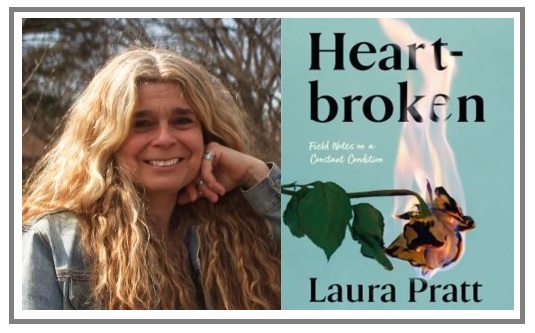
We had the pleasure of interviewing Laura Pratt, author of Heartbroken: Field Notes of a Constant Condition, published by Penguin Random House.
Laura is a long-time journalist, writer and editor. Her first memoir, The Fleeting Years, was published in 2004. She is a 2020 graduate of the University of King’s College’s creative nonfiction MFA. She won an honourable mention in Prairie Fire’s 2020 CNF contest and was shortlisted for The Fiddlehead’s 2019 CNF contest.
What is one important takeaway you want the reader to get from reading your book?
More than anything, I want readers not to feel alone. If you’ve had your heart broken, and are struggling with it, the most common response from outsiders is impatience and even disdain. Typically, folks don’t have nearly enough sympathy for someone they believe is dragging out their pain beyond a socially acceptable period. Suffer too long, and people will let you know you have overstayed their welcome for their indulgence of your distress. With my story, I hope to lend comfort and understanding to readers who are feeling similarly distressed by not only this critical emotional upset but people’s impatience for their recovery. I want to tell them I see you. I am one of you. I want to tell them they’re human, and that they can do their heartbreak however they need to.
A book cover can attract potential readers. The design is compelling. Even the word “heartbroken” is broken. Is there anything that the cover does not reveal that you want readers to know about?
I am delighted with my book’s cover, which my children tell me is “millennial blue.” I’m thrilled that you highlight the break in the title word, which I think is kind of inspired. I mean, when do you ever see a hyphenated word on a book cover? It is so unusual that it draws the eye. And then, when you understand the subject of the book, you appreciate the design choice that much more. I like the burning rose too, for its symbolism of the destruction of something beautiful, which is of course how I feel about the demise of my romance.
You make several references to music (e.g., Jackson Browne and Leonard Cohen), Greek philosophers, and other social-cultural events throughout history. How did you balance this and the research needed, with your own personal story?
I am a journalist, and it was always my intention to feature a good deal of research in this book. I like the idea of running my own story as a thread through all the universal exposition, using my personal experiences as points of contemplation for the bigger picture. I feel like my memoir serves as an intimate means of getting into considerations of the various aspects of heartbreak that everyone goes through, before stepping back and applying a more clinical eye.
What is your favourite quote from the book? Why does it stand out for you?
That’s a tough one, given the sheer number of folks I quote over the book’s course, but I think I’d have to say the quote that most resonates with me in my heartbroken years is one attributed to Buddha that goes: “No one saves us but ourselves. No one can and no one may.” I think there’s a lot of wisdom in that one for folks casting about for salvation. It teaches self-sufficiency and promotes an important home truth.
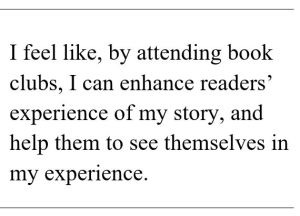
Why do you enjoy attending book clubs as an author?
Before I was a writer, I was a reader. I’m a reader still and a writer now. The opportunity to marry these passions is thrilling to me. I feel like, by attending book clubs, I can enhance readers’ experience of my story, and help them to see themselves in my experience. While there’s no question that my psyche has been improved by my writing the book, I ultimately wrote it for others, to help them navigate their own passage through this disaster. Speaking to people who have read my book and, hopefully, seen some piece of their own life experience in my words, is a great honour. Also, I find human beings pretty fascinating, and believe that any opportunity to gather and talk about emotions and hard things is a gift.
How can book clubs connect with you?
They can reach me through my email, which is malindi@sympatico.ca. I am hopeful for the chance to gather with folks who love to read and who have spent some time with my book so we might talk about the humanity of heartbreak and how it connects us all.
This post was originally published on the 11th Floor Writers website on February 9, 2016. The bio has been updated.
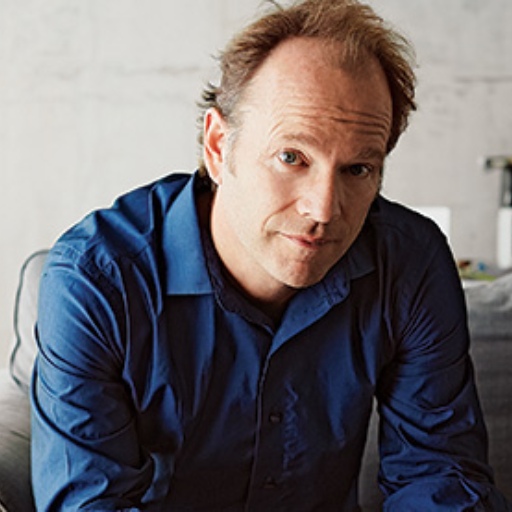
Dennis Bock has penned many highly acclaimed books, including The Ash Gardens. His novel, Going Home Again, was short-listed for the 2013 Scotiabank Giller Prize. Dennis’s newest novel, The Good German, was released in fall 2020.
Dennis also teaches Creative Writing classes, including “Writing the Literary Novel: Master Class” at the University of Toronto School of Continuing Studies.
When it comes to offering advice to aspiring and emerging writers, Dennis doesn’t pull punches. He’s honest and direct, and often says things that linger in our thoughts long after class has ended. As a token of our thanks to Dennis, we’ve compiled a list of our favourites to share.
“I’m a huge fan of something actually happening. Make your character do something.”
“Always dramatize.”
“Always create scenes.”
“Mention all the people in the room at the outset of a scene.”
“Don’t be obscure –mysterious or cagey is not attractive.”
“Never rely on abstractions.”
“Take the reader out of the story sometimes – don’t keep them stuck in the present.”
“Be wary of putting too many plot threads.” (e.g.,“I’m confused,” said a character in one of our stories.
“So am I,” replied Dennis.)
“Send your character up a tree and have him figure out how to get down. This makes your story much more interesting.”
“Don’t be afraid to take risks with your characters.”
“The narrator’s purpose is to give the reader a sense of what will happen, a sense there is a story, and a sense of urgency.”
“The narrator recounts something when time has passed and can comment and add wisdom on the subject.” (Similarly, when introducing a new character).
“The narrator knows the point of the book and should drop this in early on.”
“Find the narrator’s voice to keep the story focused.”
“Establish that the narrator is dead immediately.” (Only when your narrator is dead, of course!)
“Dialogue should be made up of only how the speaker thinks and talks. No information dumping and no stage direction. ” (i.e. “It’s 4:30,” he said.)
“Don’t use dialogue to advance the story.”
“Avoid non-words like ‘huh’ in dialogue.”
“A reader will like a fighter, not a sufferer.”
“You have to earn the reader’s confidence.”
“Keep on writing.”
Join us on May 5, 2022, 7:00 – 8:00 p.m. ET. We will begin with a short reading followed by a group discussion and Q & A.
Register for this exclusive free event by emailing us at info@theauthorsbookclub.ca. Spacing is limited to 12 guests.
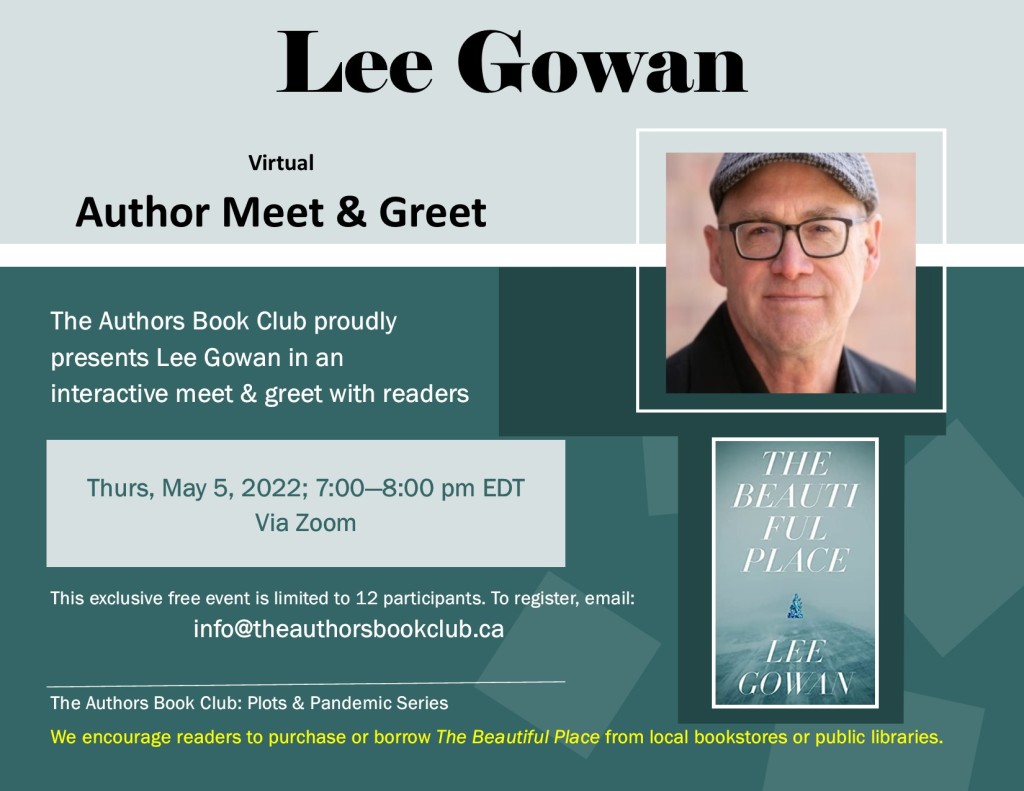
Lee Gowan is the author of the novels Confession, The Last Cowboy, (published in France as Jusqu’au bout du ciel), and Make Believe Love, which was nominated for the Trillium Award for best book in Ontario. He also published the critically acclaimed story collection Going to Cuba, and wrote the award-winning screenplay for Paris or Somewhere. He is the Program Director for Creative Writing and Business Communications at the School of Continuing Studies, University of Toronto. His latest novel The Beautiful Place was published in 2021.
Visit Lee’s website.
Guest Post by Syeda Shanzay Kamran
It’s been a year since David took a break from The Authors Book Club, an initiative he co-created in January 2019. In this interview, we catch up with him to see how he’s been doing.
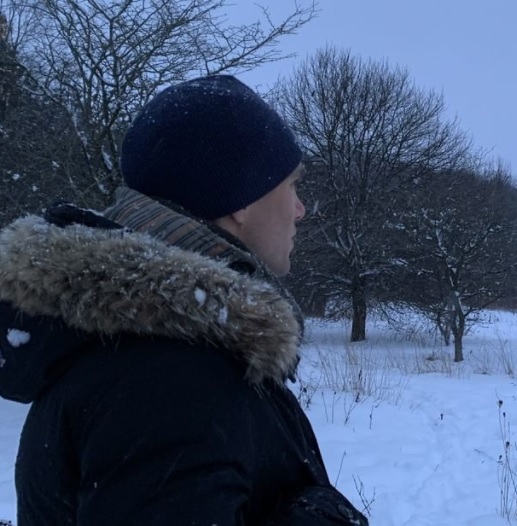
Shanzay: Undercard, released in 2019, was on the Crime Reads 2020 must-read list of 8 Debut Novels, was a finalist in the 2020 Evergreen Award, and one of 49th Shelf’s top fiction titles of 2019. How has the journey into the writer’s world been? Were you surprised by anything?
David: Coaching tennis has basically been my day job since I finished university, and transitioning from that to focusing on writing my book was a big change. After the release of Undercard, I was suddenly doing interviews and things like that. It was a lot of fun, but at times overwhelming. I did put quite a lot of pressure on myself. Maybe this was because I was a first-time author, but I felt very grateful to my publisher for giving me that opportunity, and I felt this great responsibility to sell a lot of books. I think perhaps I shouldn’t have put so much pressure on myself in that regard and instead, just experienced it.
Another thing is, when you’re unpublished, your first book is your door to entering the industry. It is kind of a weird mix of you getting this incredible opportunity; you want to capitalize on it to make sure that you have a long-lasting career. But at the same time, it’s a big thing, and it is something that you should just experience, so I think balancing that is a skill. This wasn’t something I had an understanding of going in.
Shanzay: In an interview with Fiona Ross, you shared that we might be seeing Undercard on the big screen? Can you share any updates?
David: For sure! The big difference between that and writing is that with a book you have an agent either accept your work or not. Whereas in screen work, it seems as if there are countless little steps along the way. The project has moved quite a long way. They got a screenwriter and they are developing it. I believe it’s close to being a series. Hopefully, we should know by next year. It’s fascinating because there are lots of people and a lot of production companies attached to it. It’s really exciting!
Shanzay: You mentioned in an interview with Tom Sumner that you’re working on a new book about the tennis world and crime fiction.
David: It’s grown quite large. I’m not sure if we will end up doing a large book, or maybe it will be divided into more than one book. It’s funny because when I started, I thought of it as humour, drama, murder mystery revolved around the tennis club world. Undercard was intense, so I thought something comedic would be nice. One of the characters, Antoine, who is a pivotal character, is intense. It was quite emotionally taxing to write it. By the end, I was like, this is a lot more than I thought. It’s not the same as Undercard, though it is still more relationship-based. It’s been a lot of work. By this summer I hope to have a nice solid manuscript.
Shanzay: You shared that you did a lot of research for your first book, Undercard, on boxing and how that world works. Do you enjoy the process? How do you weave your research into the storytelling? Is that easy or challenging?”
David: Weaving research into your story, I would say, is almost like a puzzle. It is sort of this complex puzzle of information about things you find interesting, that are important, that are maybe not being discussed enough. Or there may be interesting things that are just useful for people to learn about and are potentially valuable, especially an intriguing discussion that comes from academics or journalists. I find weaving that in extremely challenging, but in a fun way. I find that it is one of my favourite parts of writing.
Not only that, but I find that it is one of my strengths to take my research and weave it organically into my work, in a way that flows. If someone is reading my book purely for entertainment, it should be captivating and should have a flow to it.
Shanzay: Out of curiosity I wanted to ask, how do you take a fact and turn it into something that has depth enough for both your characters and your reader to feel?
David: One thing that works for me is when I am writing, I don’t like to have my research notes with me. I try to recall my research and just go with the flow. Then, when I’m in the editing process, I return to my notes and see where I can add my research. I sometimes feel like, in books and/or fiction, you come across a scene, and you can just tell that this person liked this part of their research and put that in there.
I would say in terms of details, I find that the least interesting part. That’s something where you can refer to your research, especially in the editing process. Throw a detail in there just to give the reader a sense of the world without going overboard.
Shanzay: How did 2021 impact your writing? Do you plan on including these years in your books in the future?
David: Recently I was watching Salman Rushdie, and he was saying that young writers shouldn’t feel like they have to write about the pandemic. But for me generally, my ideas take a long time, so by the time I’m writing something, it has already happened a long time ago. The current book is set in 2018/2019 because I started writing it before the pandemic started, so it made no sense to include it. But I think at some point I might be writing about this period.
In terms of how it affected me, I think 2020 wasn’t as productive as I would have liked it to be. There was so much going on. I had a couple of people close to me who were having a rough time, and I was trying to be there for them. It slowed me down and my writing. But otherwise the year has been quite productive.
Shanzay: Are you reading anything now? What books would you say are “must-reads for 2021”?
David: I’m re-reading Watership Down by Richard Adams. I really love it. I started reading Alice in Wonderland just because I was watching Westworld, the TV series, and it is a recurring theme in it. A book for writing that I always go back to is Hilary Mantel’s Wolf Hall. I love that book. I just love her style. I’ve read the whole series. My favourite is probably the middle one, Bring Up The Bodies. When I’m stuck writing, I go back to the opening chapter and think that this is how I want to write. I’m also reading Dubliners by James Joyce, which is a book of short stories. When I’m writing, I like to read people whose styles match mine.
This interview has been edited for length and clarity.
Syeda Shanzay Kamran is a co-op student with The Soap Box Press. Her vision is to bring comfort and happiness through her work.
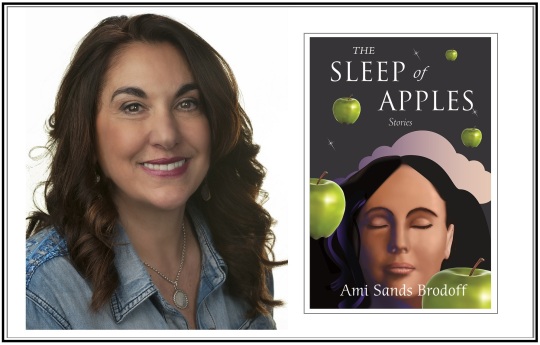
Guest Post by Chelsea Kowalski
I had the pleasure of interviewing Ami Sands Brodoff, the author of a Re-Lit Award finalist, Bloodknots, and a Pushcart Prize nominee, Can You See Me? We spoke about her newest book, The Sleep of Apples (to be released on September 30, 2021). Ami’s novel-in-stories focuses on nine closely linked characters who face challenges around mental illness, mortality, and gender identity. Ami talks about where her writing inspiration comes from, her ties to the Montreal literary community, and how she’s adapting her writing process to the pandemic.
*This interview has been condensed and edited for clarity.
CHELSEA: The Sleep of Apples covers a lot, from family relationships to gender and sexual orientation to mental health. What inspired you to explore such complicated, but important topics?
AMI: I’m drawn back again and again to writing about these themes. I come from a family where my great-great grandparents, my grandparents, and my parents were all doctors, but we’ve also struggled in our family. Certain loved ones of mine have had severe mental illness. My older brother developed schizophrenia as a teenager, and he was the person I was closest to as a child. We had a secret place and a private language. He was really a genius. He was beautiful. It’s such a devastating illness. I’m really hoping that researchers will find better treatments and that there will be better social supports. In The Sleep of Apples, there’s a character; a very talented young woman. She’s an artist, who is just becoming schizophrenic. In “Will the World Pause for Me?” we hear her perspective in her own voice. There is a character, JF, who’s suffering from very severe survivor guilt. Other characters grapple with depression. Mental illness is quite common, and stigma is really, really painful. I’m hoping through my stories, and through this book, as people become really engaged and fall in love with the characters, that experience will help to reduce stigma.
Before the pandemic hit, I lost my mother, my father, and my beloved other mother. Mortality and impermanence were really on my mind. And then the pandemic hit after that. One afternoon, when we were chatting over tea in winter, my terminally ill mother told me that she had formed a very close bond with the man that delivered food to her apartment from a little local grocery store. She said he was handsome and intelligent. He’d been a pilot and was about 25 years her junior. It really got my fiction antenna buzzing. I was so intrigued that my mom had this secret life. I was fascinated. That was kind of the seed of the title story. All of my fiction is fiction. It’s transformed through empathy and imagination.
CHELSEA: With plenty of novels and collections already under your belt, you chose to write The Sleep of Apples as separate but connected stories. What made you want to explore the short story form instead of writing another novel?
AMI: I was really interested in trying a new form in which I could dispense with a lot of the exposition and heavy backstory. I didn’t want to do just a grab bag of disparate stories. I got really attached to these characters who are all unified by living in Saint-Henri, a sort of gritty neighborhood in Montreal, that’s been slowly gentrifying. I think the reader has to be more active. The meaning comes from the relationship between the stories and the echoes between them. The connections are much stronger [than in my other short story collections] because you follow these characters through their whole lives. A character is the main character and the narrator in one story, and then you get to see them in a different light.
CHELSEA: What was interesting to me about The Sleep of Apples was that you managed to intersperse lots of big, central issues, like gender identity. What brought on a desire to explore the topic of gender and the LGBTQ+ spectrum?
AMI: I have a character, Collier, in the story, “Aurora”, who’s one of the main characters and is a non-binary teenager. I’m also a mom, and my younger son is a transgender man. And my older son is gay, so I’m a bit connected with what LGBTQ+ people might be grappling with when growing up, from the standpoint of a mother. I was able to create Collier with a certain amount of confidence. I think it’s so important as fiction writers to be able to turn to our obsessions. A lot of fiction writing is empathy and imagination, as well as experiences, in a complex mesh. Also, now that non-binary and trans people are more visible, it calls into question the whole notion of a binary that I grew up with. That’s a good thing.
CHELSEA: Speaking of mortality, in “What’s Mine is Yours”, a story that eerily mimics the fears of the last 18 months, a young girl loses her Bubbe to the flu and fears that she is to blame. Was there an intention to explore the feelings mimicked by the pandemic or was that just a coincidence?
AMI: Yeah, I think I write a lot from the unconscious at first. It’s a yes and a no. All these things were kind of playing on my imagination and simmering in my mind. I did start writing this book before the pandemic. So, I think the same way that I was intrigued with that story about my mother and the man from the grocery store, I was really affected by learning a family secret that my poor father had dealt with his whole life. He had a second little sister. When he was five, he caught measles, and his little sister contracted it and died. I never knew this, but I had always wondered why there was an 11-year gap between my father and his other younger sister, Bobbie. This event was the seed of so much of his personality. He was also a doctor. I was intrigued by this family secret and it blossomed into the first story in the book. Just having this survivor guilt and the effect that family secrets can have on subsequent generations. Even if they don’t come to light, they can produce a stealthy intergenerational trauma. I really wanted to get deep into the character of Miri, as an eight-year-old. It is uncannily relevant to COVID-19, there’s no question. I guess it was partly coincidence.
CHELSEA: What was your pathway to getting published?
AMI: Well, what’s kind of interesting is that I had some early success, which was lucky. But I wasn’t aware of how hard it could be later on. I had written a story and it was accepted by one of the best magazines at the time; a print magazine called TriQuarterly. They loved it, put it first in the issue, and it received a Pushcart Prize. This was huge for me. That became my first novel, which dealt with schizophrenia. But I’ve certainly had a lot of rejection as a writer during my career. Writers get rejected in all phases and stages. I think you really have to want to be a writer. You really have to love the process and want to do it because a lot of the time is going to be spent alone, writing. And then you’re going to have to do that for the next book. You have to love that journey of finding the story.
CHELSEA: After writing for so many years, is there a process you stand by, or has it changed over the years?
AMI: My process is that I’m very, very free in my early drafts. I get everything out on the page and try to put the critic in the outhouse, and I just write, write, write. I end up with a pretty disheveled draft, but there are always parts that really glow. Then I have a kind of sculptural process, where I figure out the shape of the story and what I need to carve away. That’s very much been my process for everything that I’ve written.
CHELSEA: Along the same vein, what would you say to budding writers who are getting their start and hoping to achieve the same success?
AMI: Well, I would say, and this is something I tell my students, whatever phase they’re at, “I want you to block out at least three to four days this week. I want you to report back to me when you’re going to do your writing”. And depending on what their lifestyle is, that block of time has to be at least two hours. Put it in your book the way you would your dentist’s appointment. Take it seriously. I really believe writing is a practice. I remember when I was younger, and I had full-time office jobs and I’d have this glimmering idea for a story. But then days and weeks and months would go by, and I couldn’t address it. It’s just going to die like a flower without water. But if you sit down at your desk, even if it doesn’t seem like anything’s happening, you’re going to get an idea while you’re swimming or walking. It’s going to build if you carve out some time around your writing where you won’t be interrupted. That’s my biggest advice.
CHELSEA: I love that. That’s a really determined process along with what sounds a lot like writer self-care. Has that form of self-care worked for you all this time, or has it changed in the pandemic?
AMI: Well, I’m pretty physical. I am a big swimmer and swim a mile a few times a week. I love the water. I find being in the water is just heaven for me. I need to move, so I ride my bike. I walk. I get a lot of my ideas in motion. I’ve also been fortunate in having “a room of one’s own” to quote Virginia Woolf, where I can close the door. That’s my space for my writing.
CHELSEA: That’s wonderful. How do your ties to the local writing community impact you as an established writer?
AMI: I think we have a really vibrant community here in Quebec and Montreal. It is really nice having a writing community to talk to at certain points when you’re going through different things with your projects. The Quebec Writers’ Federation supports Anglophone writers in Quebec through all sorts of initiatives and programs. I was a part of StoryScaping, a program created for writing, spoken word, and storytelling workshops for seniors and teens in underserved areas of Quebec.
CHELSEA: That’s awesome! Is there a moment that sticks out in your mind from appearing at a book club meeting that has remained with you through the years?
AMI: I’ve really loved doing panels and book groups. The questions that people have to ask about the books are really interesting. I think the moment that sometimes comes up with each book group is a real sense that each reader has gotten something unique from the book that you’ve written. And it’s a really individual response, like falling in love. I love to see the different kinds of responses because I have five books now. I have done book groups and panels for all of them. But it’s always so interesting what the individual person brings to and gets out of work that I create. I love that.
CHELSEA: You mentioned that you are working on a new book called Treasures That Prevail. Are you able to tell me a little bit about it?
AMI: Sure. It’s about a young, Hasidic girl from the Lubavitch community, who has a kind of a breakdown, and develops a bond with her secular Jewish therapist. My ancestors were Hasidic so it’s kind of interesting to explore the culture. I’m trying to not only see what’s difficult about being Hasidic, but also the beautiful elements to it as well.
If you would like to read more about Ami, her works, or invite her to attend a book club meeting, you can do that here.
Chelsea Kowalski is a recent graduate from Ryerson University’s Publishing program and an alumna from the University of Toronto. She is passionate about all things literary (especially female-driven books) and loves interviewing new authors about their unique stories. Chelsea is happiest when given the chance to write, edit, and help support someone’s dream of reaching readers. Follow her on Twitter.
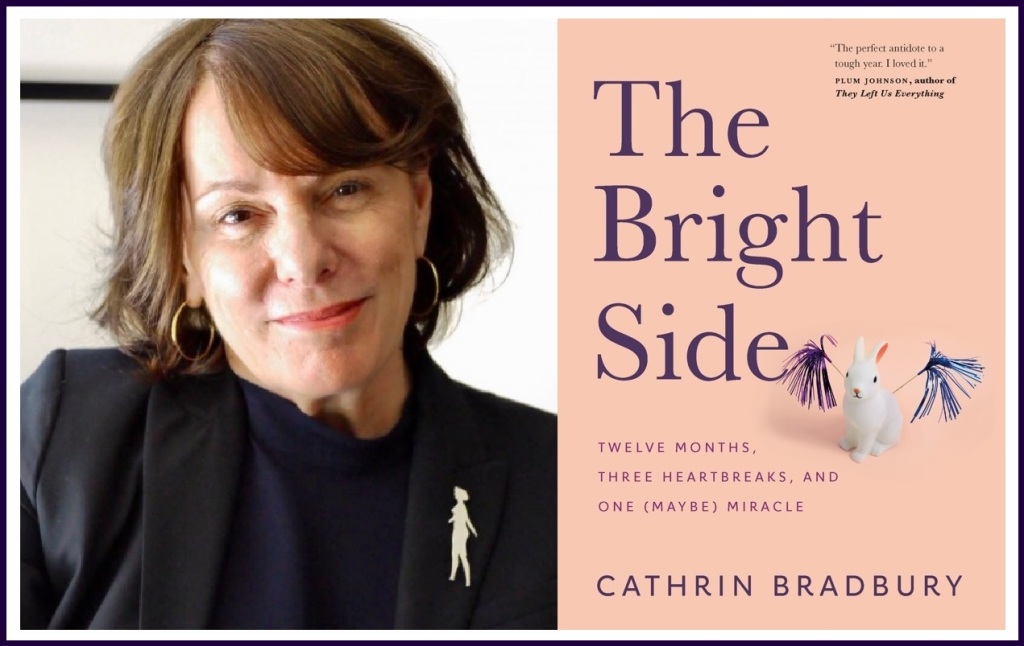
Guest Post By Chelsea Kowalski
This month, I had the pleasure of interviewing Cathrin Bradbury, currently a Senior News Director at CBC News and the newest addition to The Author’s Book Club. Cathrin’s debut novel, The Bright Side, is the story of just one year of Cathrin’s life in which she faced immense grief over the death of both her parents, the end of her 25-year marriage, and the disappointment of a new romance gone sour. But amongst the dark times came points of light and even a miracle (maybe), including her brother’s return to sobriety, old friendships that were reignited, and a new family dynamic between Cathrin and her adult children. Cathrin sat down with me (virtually) to answer all of the burning questions any of her readers might have.
*This interview has been condensed and edited for clarity.
CHELSEA: You’re published with Penguin Random House Canada, a giant in the industry. However, your book launch came on the cusp of the global recognition of the pandemic, which caused lockdowns and all in-person events in Ontario to go virtual. What was it like to experience a virtual book release, along with all the online events that came afterwards?
CATHRIN: It’s sobering to have a virtual launch, with all the energy and excitement of talking about your new book to your family and friends, and then when the call is over you are sitting alone in your kitchen. No hugs or wild after-parties. At the same time, because it’s virtual, people can join from all over the world. My colleagues from London were at my Zoom launch, and my sister in Vancouver; friends from New Orleans and Argentina. Zoom democratizes our social events. Everyone can be part of it, and we’re all the same tiny square on the screen.
CHELSEA: With such an amazing platform already, The Bright Side, your debut into authorhood, has gained a ton of attention. Where did the idea for the premise come from?
CATHRIN: I was approached by a publisher because I had been writing articles in the Toronto Star, often about my family, and they wanted to know if I had a book in me. I said, “I want to write about one difficult year in my life.” And she said, “Yeah, no, that’s not going to work.” We talked about writing about female friendship or giving up shopping. So my first pitch was actually about the year I gave up shopping, and I wove in all the other events, like my parents’ death and being fired. But shopping was just too slender a thread to attach everything onto. A couple months after that pitch, I wrote the pitch I originally wanted, which was about the year that changed me. I worked hard on that new pitch. And that was the one that took.
CHELSEA: How has your past (and current) experience as a leader and editor in Canadian news media influenced your writing process?
CATHRIN: I have been an editor for maybe 30 years. I didn’t want to be a writer. I very much enjoyed being in the background. I worked with a lot of terrific, established writers and I mentored writers and journalists starting out. So when I began to write, I definitely had the editor’s voice in my head, almost too much. I had to train myself to not self-edit when I was in the writing process. I had to keep that at bay. But once I got things down on the page, I was very comfortable with the editing process. I love being edited. I just say, “bring it on, bring it on. I’ll take every note.”
CHELSEA: The Bright Side contains a lot of life lessons, especially for working women. What’s the one thing you hope your readers will take away from your memoir?
CATHRIN: That we are all capable of tremendous change at any point in our lives. That we can become a kind of observer of our life, as opposed to a manager. I think it’s particularly hard for women because so much of the household jobs and the raising of kids falls to them. So you’re kind of forced into a role to keep everything going. I describe myself as the tugboat of my family.
In this terrible year that happened, both my parents died, my divorce was finalized, the wiring in my house was just hazardously hanging out, and a promising new man turned out not to be so promising. There was so much piled on top of each other that I simply couldn’t behave in the same way I had before. I couldn’t keep the forward momentum; I had to just let life happen to me. And then things got super interesting. If you find that life comes at you all at once, try not to panic; try to sit back and watch what’s going on.
CHELSEA: There’s a big underlying theme in your book about finding resilience and strength during chaotic (and catastrophic) times. How have you found strength during the pandemic and a way to look at the bright side?
CATHRIN: It’s pretty strange. I hit send on a book called The Bright Side. And literally a week later, we became locked down worldwide. I could not believe it. It felt personal.
It’s frightening to go through a terrible year, and it’s frightening to go through COVID, in the beginning, especially. But COVID – and The Bright Side – taught me that the darkness is always there. It’s an illusion to think that we’re protected from anything. We’re one inch away from disaster. There is a thin veil between all is won and all is lost, and COVID kind of taught us it’s better to let the darkness in and hold it and see what it has to tell you.
CHELSEA: Book clubs – whether in-person or virtual – provide an incredible form of support for an author. Is there a book club experience you had that you will never forget?
CATHRIN: One book club I attended had eight people and one said, “Well, we all know Cathrin’s story, but Cathrin doesn’t know our stories.” So each of them took a turn and just pulled out a little bit about themselves. They talked about different things. Some talked about their jobs. Some talked about having a sibling with addiction issues (which my brother faces in the book). Some talked about a mother who was dying. Some talked about children. It was a really special conversation because I got a lot of insight into each of these people. We meet people briefly, but when you just open that door a little bit, there’s so much that we carry around. There’s so much good and difficult that we carry around in terms of who we are. So that was a good moment.
CHELSEA: There are budding writers who will see your memoir and hope to achieve the same success. What would you say to them about getting their start?
CATHRIN: I’ve spoken to a number of book clubs and a number of writing groups. Some of them are specifically memoir writing groups, and boy, people have good stories to tell. I’m never bored when they tell me what it is they’re working on. Everyone’s got an incredible story. I was super lucky that I got to tell mine, that I got a publisher and I’m always very happy to share any practical tips I have. I had people who were extremely generous with me and gave me advice and emotional support when writing my first book. I think it’s important to give that back.
CHELSEA: Sometimes the pathway to getting published can seem quite easy to those of us on the reader side. Can you talk about any challenges you faced in your journey to get here and how you got through them?
CATHRIN: Well, I have been rejected a lot. I didn’t start writing until quite late. I think I was very afraid of rejection. I focused on editing where you don’t really get rejected in the same way. And then I began to write. I wrote an essay for Modern Love in The New York Times. You have more of a chance, I now know, of being struck by lightning than you do of getting published by the Modern Love section. But I really worked on that piece, and I thought it really hit the bar. I got a pro forma rejection letter. I put it in my bottom drawer and didn’t try anything again for a couple of years. I was too easily wounded. I wrote a screenplay with a friend, too. It got widely read and rejected over and over and over again. And you would have to go and pitch it in person. It was brutally tough. You do just have to pick yourself up and keep going. I think you’re allowed to lick your wounds for a while but keep going.
CHELSEA: What are you currently reading or hoping to read very soon?
CATHRIN: When I’m writing, I read voraciously. Currently, I’m reading Thomas King’s Sufferance, which is incredibly timely. I’m a big fan of his voice and persona.
CHELSEA: Can you give a sneak peek of what you’re working on now?
CATHRIN: Well, I’m working on another book. You open up that place in yourself, and it needs to come out and wants to come out, and you can’t really shut it up. So I’m just going to keep going. It’s another non-fiction, but not a memoir. It’s more subject driven. But I’ve toyed with the idea of fiction. I have about three things in my back pocket that I take out every now and then. But for now I want to develop this nonfiction voice.
If you would like to read more about Cathrin, her work, or invite her to attend a book club meeting, you can do that here!
Chelsea Kowalski is a recent graduate from Ryerson University’s Publishing program and an alumna from the University of Toronto. She is passionate about all things literary (especially female-driven books) and loves interviewing new authors about their unique stories. Chelsea is happiest when given the chance to write, edit, and help support someone’s dream of reaching readers. Follow her on Twitter.
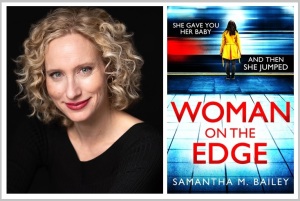
Guest Post By Chelsea Kowalski
Recently, I had the pleasure of interviewing established author, Samantha Bailey, about her latest book, Woman on the Edge, as well as her life in the pandemic, her writing process, and even a peek into her new book (coming in 2022). Samantha has worked as a journalist, a freelance editor, and has written five books. Her latest, Woman on the Edge, is a psychological thriller, and became an instant Canadian hit. Her novel spent twenty-two weeks on the Toronto Star and Globe and Mail bestseller lists, received a starred review from Publisher’s Weekly, and was a PW Best Books’ Pick of the Week. It was also the December 2019 Fiction Book of the Month at Indigo.
*This interview has been condensed and edited for clarity.
CHELSEA: Woman on the Edge is your first book with Simon and Schuster, a major Canadian publisher. Bigger publishers often come with national publicity, foreign sales, more buzz. etc. How were you able to adapt to the bigger release and level of attention that came with a major publisher contract?
SAM: I’ve been writing for two decades and while Woman on the Edge is my traditionally published debut, it’s the fifth book I’ve written. After twenty years, two agents, and many, many rejections, I am ecstatic to finally have a home with Simon and Schuster. I’d dreamed of working with editors, publicists, marketing, and salespeople who believed in me and my voice. Simon and Schuster Canada has the most dedicated, hardworking team. I couldn’t believe I got to be on national television and radio, that Indigo chose my debut as their December 2019 fiction staff pick, and there was an entire wall of Woman on the Edge when you walked in the door. It was surreal, wild, and the most incredible experience of my life.
CHELSEA: How do you find a balance between writing a story that’s marketable but also heartfelt and a form of artistic expression?
SAM: This is, I think, the crux of commercial fiction. My ultimate goal is to write the very best book I can, stay true to my voice and the story, and entertain. I want my books to both feel like an escape and provoke thought and discussion. This is my livelihood and my art. I pour my entire soul into my work, which is scary and cathartic, and I always keep in mind that I am providing a respite from life in many ways.
CHELSEA: Can you describe the editing process for your work, from both yourself and your editor?
SAM: Intense! I am also a freelance editor and have had my own business for over ten years editing manuscripts for other authors. I have deep respect for the editing process and for me, at least, the magic is in the revisions. Both my agent and editors are invaluable. My agent taught me how to outline and the elements and beats that are crucial in a thriller: the characters’ goals and motivations, a three-act set-up, showing the thoughts and feelings of the characters without being too heavy-handed. My editors taught me pacing, how one sentence can say so much more than a rambling paragraph, to pull all the threads together, and make sure each word is as powerful as possible.
CHELSEA: What advice would you give to budding writers who see your name on the bestseller lists and want to achieve the same success?
SAM: Never in my wildest dreams did I expect to hit number one on the Canadian bestseller lists and become a USA Today bestseller. I dreamed about it like I dream of being five inches taller. I’ve learned that anything is possible. I’m not an overnight success by any means. I think authors who long for a publishing deal, to be a bestseller, have to dream big and go for it. I never gave up. Writing is my identity, my heart and soul, and I can’t imagine my life without it. So, my first piece of advice is never stop. If you have a story to tell, just start and keep going. My second suggestion is to find your people, those authors and readers who become your community. I’m very blessed to have the most amazing, supportive group of author and reader friends, who cry with me when things are hard and celebrate with me when they are spectacular. Publishing is a business full of ups and downs and having that support is so important.
You can find your people through social media, or through dedicated workshops, like Bianca Marais’s. Bianca runs fabulous courses and a podcast. And it is vital to accept and embrace the editing process. A first draft is just that—a place where you begin. Cutting, slashing, tearing your words apart is part of the process, and it’s okay to make mistakes.
CHELSEA: Do you have a reader in mind when you write? If so, who?
SAM: I don’t have a specific reader in mind when I write my first draft. I let myself bleed on the page and tell the story as I see it in my mind. I do very detailed outlines beforehand to make sure I hit all the beats, and I try to apply all the lessons I’ve learned.
CHELSEA: Is there a memorable moment that sticks out in your mind from speaking/appearing at an event like a panel or even a book club meeting?
SAM: My very first large in-person event was at the Kitchener Public Library, one of the most beautiful spaces I’ve ever seen. I was scared, excited, and worried because I live in Toronto and don’t drive on highways. Maybe because I’m a thriller writer, and I imagine the worst possible scenarios. The author interviewing me that winter night was Marissa Stapley, who doesn’t drive. It was snowing hard, and we could have taken the train, but our extraordinary publicist, Jillian Levick, arranged for a car to take us. Oh, did we feel like rock stars!
The crowd was so kind and engaged; Sheila Bauman, the event planner, was not only warm and friendly, soothing my nerves, but also made us snacks to take home. Matt MacKinnon, the events manager, pulled everything together, and Marissa asked excellent questions. I was shocked at the lineup for me to sign copies of Woman on the Edge, and how many people came to see us in a storm. I’ll never forget it.
CHELSEA: Can you talk about a time that you received an unexpected rejection and how you got through it?
SAM: I have received hundreds of rejections. I think the first ones were the most unexpected because I knew so little about publishing then. I started out writing edgy rom coms and signed quite quickly with a New York City agent for two of them. I truly believed that within months, I’d be wearing Manolo Blahniks, sipping Cosmos, and signing my book at a Manhattan bookstore. Well, that never happened because both of those rom coms were resoundingly rejected on submission. It was my first lesson that sometimes you will get what you want in the most unexpected ways and that my path was not going to be fast or easy.
CHELSEA: How do you practice self-care as a writer?
SAM: I just finished my second draft of my next book, and I’ve written in every room in the house to find the quietest space. I’ve discovered there is no quiet space. I love to lose myself in books and television, and both are essential to my self-care. I also walk my dog, do yoga, play tennis horribly, and try to make sure I take breaks when I need to.
CHELSEA: What does success look like to you moving forward, in terms of your career as a writer?
SAM: I want to write for the rest of my life. It’s all I’ve ever truly wanted to do. I still have big dreams like hitting The New York Times bestseller list, seeing screen adaptations of my work, and when it’s safe again to be with other people, to see someone on public transit, an airplane, on a beach, reading my books. Truly, though, I just want to make a living from writing and satisfy my readers.
CHELSEA: Can you give a sneak peek of what you’re working on now?
SAM: I can give a little peek! I just submitted it to my editor. It’s my first book set in Canada, Vancouver and Toronto, and it’s a thriller about obsession, identity, and what we hide from those closest to us, even from ourselves. I love this story so much and hope my readers will, too!
Update: Samantha’s newest book, Watch Out For Her, with Simon and Schuster Canada, was announced shortly after this interview was published and is set to come out in April 2022. Go here to pre-order!
If you would like to read more about Samantha, her work, or invite her to attend a book club meeting, you can do that here!
Chelsea Kowalski is a recent graduate from Ryerson University’s Publishing program and an alumna from the University of Toronto. She is passionate about all things literary (especially female-driven books) and loves interviewing new authors about their unique stories. Chelsea is happiest when given the chance to write, edit, and help support someone’s dream of reaching readers. Follow her on Twitter.
More than a year later, we continue to reimagine ways to connect readers with authors living and working in Canada. We have encouraged virtual book club meetings and tried new and creative ways to bring people together, including our first “Book Tasting Event” co-hosted with The Soap Box Press. Authors Hannah Mary McKinnon, Victoria Hetherington, Cindy Aronson and Tamara Herman recommended food and drinks to pair with their books. They met with guests in private virtual rooms for this highly interactive experience.
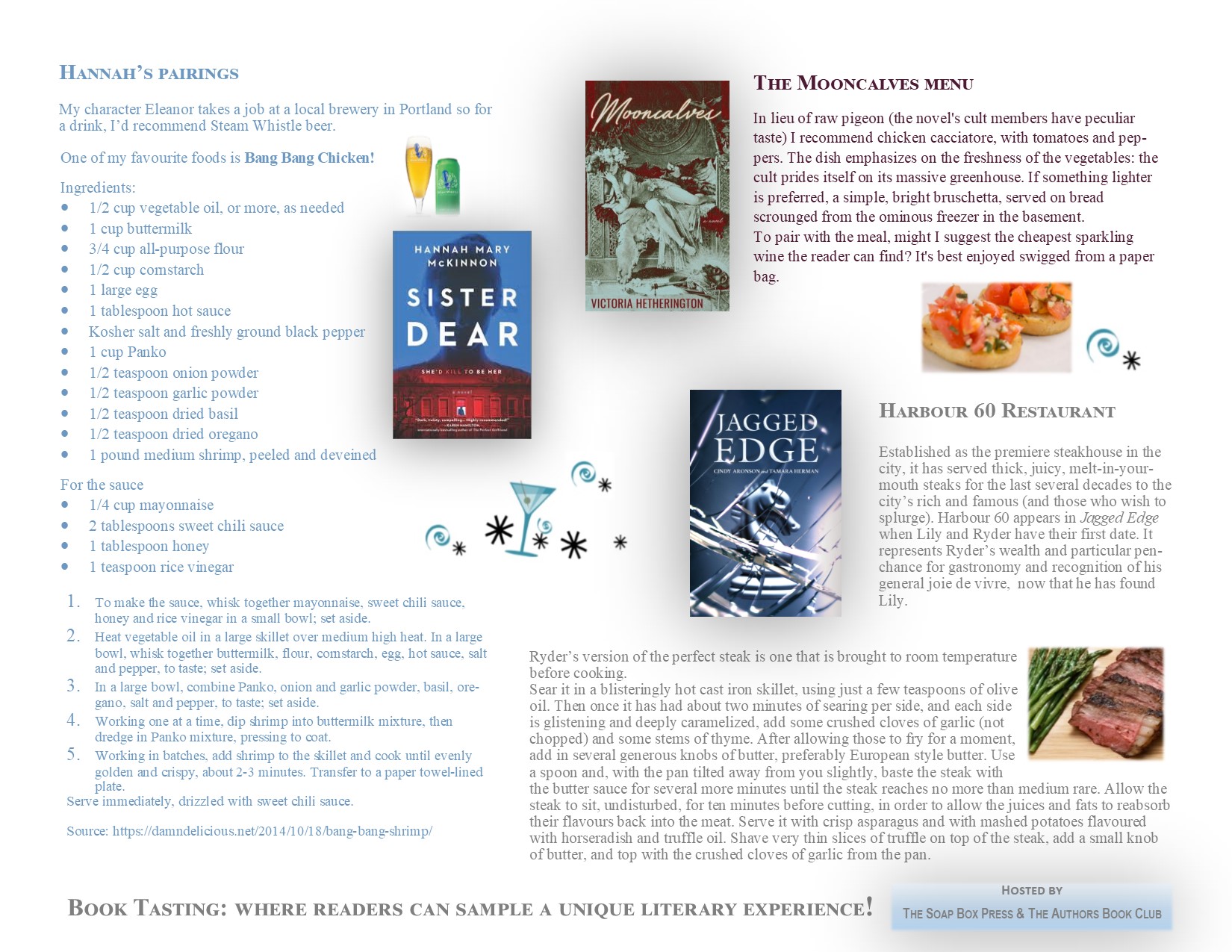
Early 2021 brought us new reads like the mysterious Son of Sherlock (Dorothy Ellen Palmer), the awaited Starr Sign (C.S. O’Cinneide), and the romantic comedy, Accidentally Engaged (Farah Heron).
April was a big month! The crime-riddled thriller, Lucky (Marissa Stapley), the darkly funny Six Weeks To Live (Catherine McKenzie), and the empowering Hana Khan Carries On (Uzma Jalaluddin) were released.
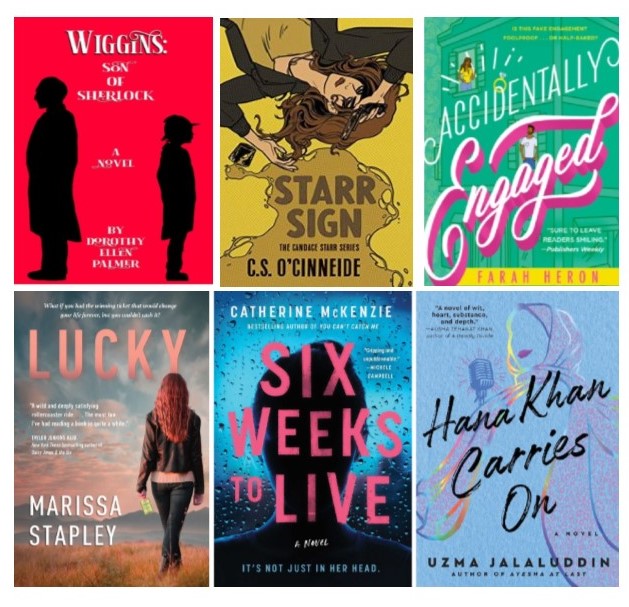
As always, April showers brings May… books! A bunch of new titles are hitting the shelves this month! The exciting Lost Immunity (Daniel Kalla) and the romantic Letters Across the Sea (Genevieve Graham) are out now. New thrillers, You Will Remember Me (Hannah Mary McKinnon), and The Sister’s Tale (Beth Powning), are available on May 25, 2021.
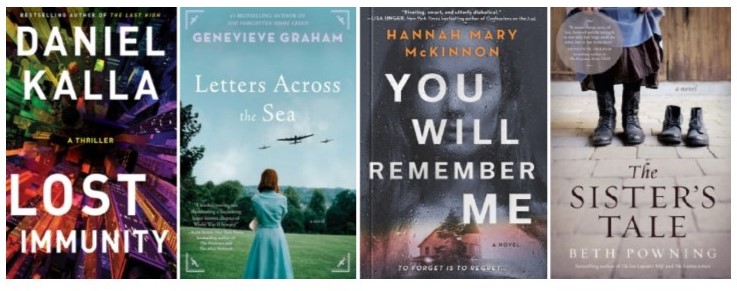
See our complete Spring 2021 Newsletter.
Join us on May 20, 2021, 7:30 – 8:30 p.m. ET. We will begin with a short reading followed by a group discussion and Q & A.
Register for this exclusive free event by emailing us at info@theauthorsbookclub.ca. Spacing is limited to 12 guests.
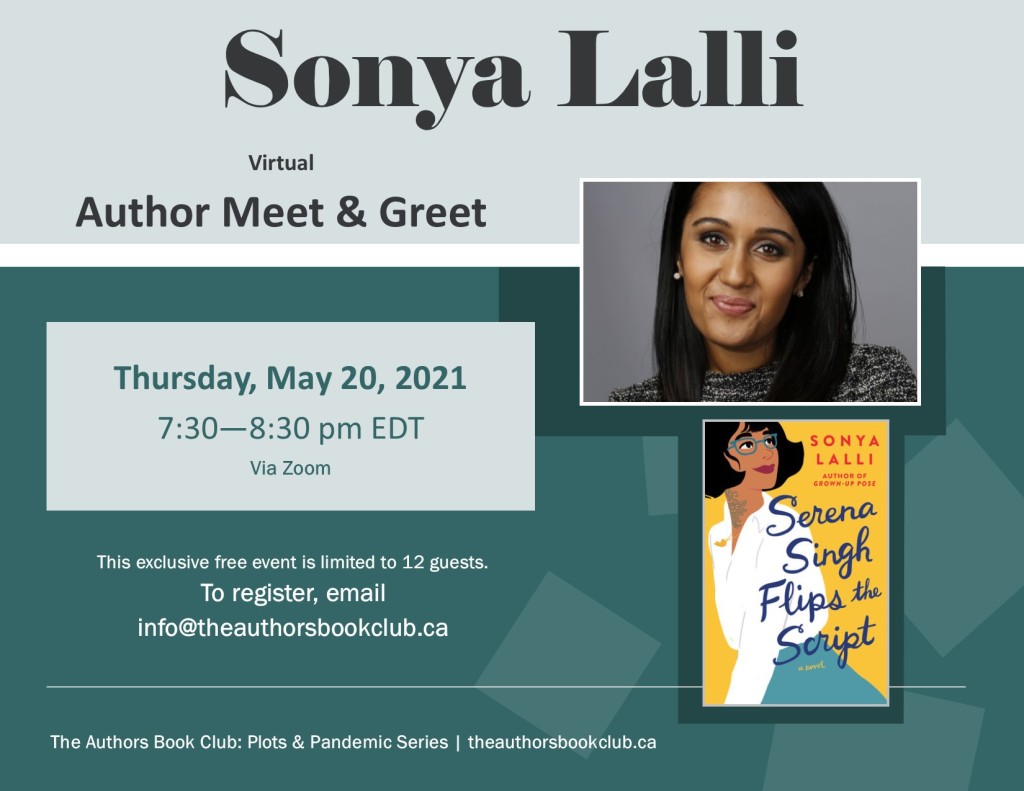
Sonya is a Canadian writer of Indian heritage. She studied law in her hometown of Saskatoon and at Columbia University in New York, and later completed an MA in creative writing and publishing at City, University of London. Sonya has a black belt in taekwondo and loves travel, yoga, and cocktail bartending. She lives in Toronto with her husband.
Visit Sonya’s website.